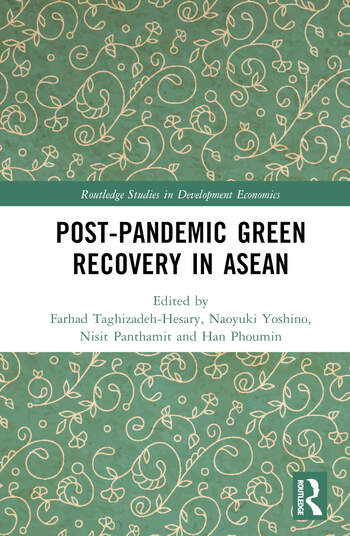Post-Pandemic Green Recovery in ASEAN
Print Article:
ASEAN’s real gross domestic product (GDP) had declined sharply due to the COVID-19 pandemic. The economic downturns and the uncertainty about the future reduced the new investments in green projects drastically. Besides this, many governments rolled back environmental regulations and taxes and increased fossil-fuel intensive infrastructure and electricity to stimulate economic growth. Post-Pandemic Green Recovery in ASEAN consists of several empirical studies using fresh data, with regional and country-level perspectives on ways to keep the greenness of the economic recovery plans.
The chapters look at various aspects and sectors, including tourism, infrastructure, energy, Small and Medium Enterprises (SMEs), employment, and livelihood, by assessing the effectiveness of various tools and instruments, including green finance, carbon taxation, green Sukuk, credit guarantee, cash transfer payment, power purchase agreements, and the related policies. They also provide practical policy recommendations useful for the ASEAN member states and other developing regions for the green recovery in the post-pandemic.
Reiterating the importance of green and low-carbon mechanisms and climate change tackling policies besides the usual economic recovery strategies, this book is a precious resource for the researchers of economics, finance, ASEAN and Asian studies, and policymakers.
Table of Contents
Section 1: Theoretical Background and Thematic Studies
- Financing Small and Medium Enterprises for the Green Recovery in ASEANFarhad Taghizadeh-Hesary, Ehsan Rasoulinezhad and Han Phoumin
- Carbon tax and the green recovery: Policy Implications from a general equilibrium model, Naoyuki Yoshino, Ehsan Rasoulinezhad, Farhad Taghizadeh-Hesary
- Green Recovery of the Power Sector with Innovative Power Purchase Agreements, Farhad Taghizadeh-Hesary, Naoyuki Yoshino, Ehsan Rasoulinezhad, Cedric Rimaud
Section 2: Regional Studies and Country Studies
4. Green Finance Policies to Accelerate the Economy Recovery in ASEAN Countries, Sakib Bin Amin, Farhad Taghizadeh-Hesary, Mahatab Kabir Khandaker, Juhi Jannat, Farhan Khan
5. An empirical assessment of ways to achieve a green economic recovery in the Post-Pandemic in ASEAN, Ehsan Rasoulinezhad, Farhad Taghizadeh-Hesary
6. ASEAN’s Green Recovery and the Role of Green Stimulus in Job creation in a Post-COVID World, Dharish David, Sanjana Bernadette Williams
7. Role of green infrastructure in facilitating trade recovery in ASEAN, C. T. Vidya, Farhad Taghizadeh-Hesary
8. The Perspective and Recommendations for the Green Recovery of the Tourism Sector in Thailand, Pairach Phiboonrungroj, Chukiat Chaiboonsri, Satawat Wannapan, Pichamon Songsang
9. The Post Pandemic Green Economic Recovery, Livelihoods, and Adaptations in ASEAN, Phanhpakit Onphanhdala, Vanvisa Philavong
10. Exploring the Gastronomic Driving Factors of Tourism Demand to Foster the Green Economic Recovery in the Post-Pandemic, Pairach Phiboonrungroj, Chukiat Chaiboonsri, Satawat Wannapan, Banjapon Thongkhaw
11. The Potential and Challenges of the Green Sukuk for Financing the Green Economic Recovery in Indonesia, Marissa Malahayati, Lukytawati Anggraeni.
About the book
Edited by Farhad Taghizadeh-Hesary, Naoyuki Yoshino, Nisit Panthamit, Han Phoumin
232 Pages 53 B/W Illustrations
Series: Routledge-ERIA Studies in Development Economics
More Information
Click here to purchase the book. Hardback version available.





